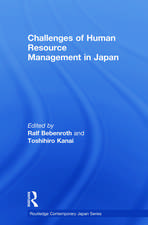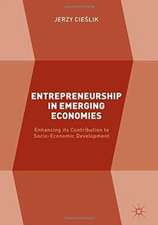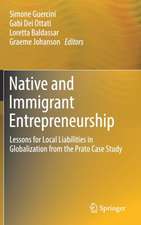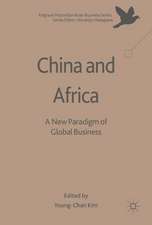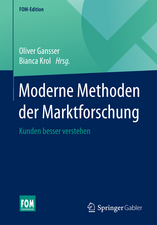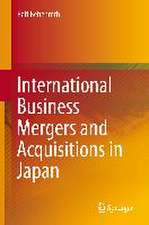The Great East Japan Earthquake and Its Impact on German Firms: An Empirical Study: SpringerBriefs in Business
Autor Ralf Bebenrothen Limba Engleză Paperback – 30 oct 2013
Din seria SpringerBriefs in Business
-
 Preț: 262.86 lei
Preț: 262.86 lei -
 Preț: 382.75 lei
Preț: 382.75 lei -
 Preț: 410.39 lei
Preț: 410.39 lei -
 Preț: 342.74 lei
Preț: 342.74 lei -
 Preț: 380.25 lei
Preț: 380.25 lei -
 Preț: 380.25 lei
Preț: 380.25 lei -
 Preț: 414.21 lei
Preț: 414.21 lei -
 Preț: 476.95 lei
Preț: 476.95 lei -
 Preț: 341.97 lei
Preț: 341.97 lei -
 Preț: 385.84 lei
Preț: 385.84 lei -
 Preț: 345.45 lei
Preț: 345.45 lei -
 Preț: 343.97 lei
Preț: 343.97 lei -
 Preț: 343.98 lei
Preț: 343.98 lei -
 Preț: 378.54 lei
Preț: 378.54 lei -
 Preț: 375.45 lei
Preț: 375.45 lei -
 Preț: 443.75 lei
Preț: 443.75 lei -
 Preț: 444.74 lei
Preț: 444.74 lei -
 Preț: 476.03 lei
Preț: 476.03 lei -
 Preț: 379.48 lei
Preț: 379.48 lei -
 Preț: 340.83 lei
Preț: 340.83 lei -
 Preț: 377.18 lei
Preț: 377.18 lei -
 Preț: 345.50 lei
Preț: 345.50 lei -
 Preț: 378.12 lei
Preț: 378.12 lei -
 Preț: 376.43 lei
Preț: 376.43 lei -
 Preț: 376.59 lei
Preț: 376.59 lei -
 Preț: 374.85 lei
Preț: 374.85 lei -
 Preț: 346.86 lei
Preț: 346.86 lei -
 Preț: 341.75 lei
Preț: 341.75 lei -
 Preț: 344.14 lei
Preț: 344.14 lei -
 Preț: 377.18 lei
Preț: 377.18 lei -
 Preț: 377.95 lei
Preț: 377.95 lei -
 Preț: 343.72 lei
Preț: 343.72 lei -
 Preț: 374.08 lei
Preț: 374.08 lei -
 Preț: 375.23 lei
Preț: 375.23 lei -
 Preț: 375.62 lei
Preț: 375.62 lei -
 Preț: 376.43 lei
Preț: 376.43 lei -
 Preț: 377.73 lei
Preț: 377.73 lei -
 Preț: 376.22 lei
Preț: 376.22 lei -
 Preț: 347.31 lei
Preț: 347.31 lei -
 Preț: 376.59 lei
Preț: 376.59 lei -
 Preț: 376.22 lei
Preț: 376.22 lei -
 Preț: 343.72 lei
Preț: 343.72 lei -
 Preț: 383.12 lei
Preț: 383.12 lei -
 Preț: 376.22 lei
Preț: 376.22 lei -
 Preț: 376.22 lei
Preț: 376.22 lei -
 Preț: 342.74 lei
Preț: 342.74 lei -
 Preț: 377.73 lei
Preț: 377.73 lei -
 Preț: 379.09 lei
Preț: 379.09 lei -
 Preț: 377.18 lei
Preț: 377.18 lei
Preț: 341.64 lei
Nou
Puncte Express: 512
Preț estimativ în valută:
65.38€ • 67.45$ • 55.34£
65.38€ • 67.45$ • 55.34£
Carte tipărită la comandă
Livrare economică 04-18 martie
Preluare comenzi: 021 569.72.76
Specificații
ISBN-13: 9784431544500
ISBN-10: 443154450X
Pagini: 64
Ilustrații: X, 52 p. 10 illus., 8 illus. in color.
Dimensiuni: 155 x 235 x 3 mm
Greutate: 0.1 kg
Ediția:2014
Editura: Springer
Colecția Springer
Seria SpringerBriefs in Business
Locul publicării:Tokyo, Japan
ISBN-10: 443154450X
Pagini: 64
Ilustrații: X, 52 p. 10 illus., 8 illus. in color.
Dimensiuni: 155 x 235 x 3 mm
Greutate: 0.1 kg
Ediția:2014
Editura: Springer
Colecția Springer
Seria SpringerBriefs in Business
Locul publicării:Tokyo, Japan
Public țintă
ResearchCuprins
Chapter 1 Disaster Impact 1 Introduction 2 Firm Level Impact (Why Focus Solely on German Firms? Questionnaire Based Research) 3 Economic Impact and Move (Temporary Closing or Relocation. Economic Impact. Autonomy and Leaving Japan?) 4 Situation of Non-Japanese Employees After the Disaster (Headquarter Sent Expatriates. Short-Term Visitors. Locally Hired Non-Japanese) 5 Results and Conclusion.- Chapter 2 Subsidiary Autonomy and Expatriate Retreat 1 Introduction 2 Theoretical Background. 3 Development of Hypotheses 4 Methods 5 Results 6 Discussion 7 Conclusion.- Chapter 3 Subsidiary Dependency on Expatriate Departure and Headquarter Trouble 1 Introduction 2 Theoretical Background 3 Development of Hypotheses 4 Methods 5 Results 6 Discussion 7 Conclusion.- Chapter 4: Closing Chapter.
Notă biografică
Dr. Ralf Bebenroth, born in Germany, is a tenured Professor for Business at Kobe University. After being awarded twice with a two year post doctoral fellowship to Japan, one from DAAD and the other from Humboldt foundation, he started working at Kobe University in 2005. Ralf Bebenroth spent the first five years of his academic career at Kobe University conducting research about business and economics solely in Japanese language.
Caracteristici
The first published research to date on the impact on foreign firms of the 2011 Great East Japan Earthquake Is relevant to researchers of Japanese economy as well to foreign investors who have an interest in Japan-based foreign firms Demonstrates that the Japanese economy will remain strong and continue to be a worthwhile topic of research

